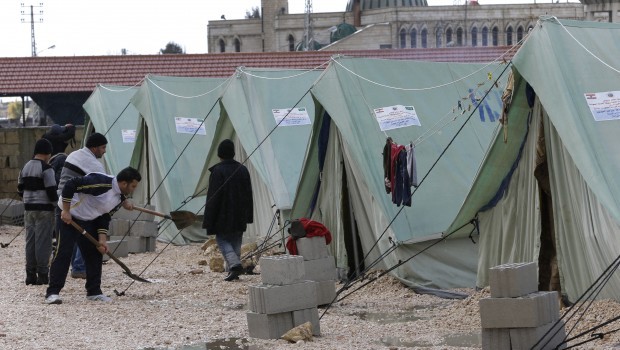
In this picture taken on January 7, 2013, Syrian refugee men stop water from entering their tents at a temporary refugee camp in the eastern Lebanese town of Marj, near the border with Syria. (AP Photo/Hussein Malla.)
In the light of these factors, humanitarian aid organizations in Lebanon, including those working under the umbrella of the United Nations, are urged to push forward for the development of the host communities in Lebanon particularly in the domains of health and education as well as basic state facilities.
These concerns echo the appeal for USD 1.6 billion issued by the UN and its humanitarian aid partners last June, to assist Lebanon in meeting the needs of those caught in the exodus from Syria.
According to international officials working in humanitarian aid, the escalating refugee crisis in Lebanon further highlights the need to support the tiny Mediterranean country. Syrians currently constitute one third of its total population.
Speaking exclusively to Asharq Al-Awsat, Ninette Kelly, a representative of the United Nations Higher Commission for Refugees (UNHCR), said: “We look forward to all possible means that would provide funding for sustainable development of Lebanon and support of the infrastructure.”
Kelly revealed that one of the suggestions is to “set up a trust fund to be managed by the World Bank in coordination with the Lebanese government,” clarifying at the same time that “we cannot predict today whether this mechanism will be successful or not.”
“This suggestion is tentative, and is only one of the suggestions on the table,” she added.
Kelly said: “In the past few months, we have put forward a suggestion to the Lebanese government to establish temporary transit camps for Syrian refugees and frequently advised that thsi would accommodate the increasing number of refugees.”
“This remains one of the options under discussion today,” Kelly said. “In coordination with Lebanese government, we have chosen several plots of land that are technically suitable for establishing transit centers, but we still have not obtained any political approval from the Lebanese government.”
Luca Renda, the director of the United Nations Development Program (UNDP) in Lebanon, informed Asharq Al-Awsat on Friday: “No final decision has been made yet regarding the trust fund. What we are trying to do now is to find a mechanism to facilitate the flow of funding from the donors to Lebanon, ensuring the effectiveness and transparency of the mechanism on the one hand and that all activities are subject to coordination on the other.”
Renda predicted that a final decision would be made in early September.
The UNDP director announced that “the number of Syrian refugees in 300 or 400 Lebanese villages has exceeded that of their Lebanese residents,” adding, “We are urgently pressuring the international community to provide more funding to invest in the host Lebanese communities and to send strong signals to the international community that it shares the burden of refugees with Lebanon.”
In a separate development, Mohamed Sarmini, a member of the Syrian National Council and the Syrian National Coalition’s press office, revealed to Asharq Al-Awsat that “the Syrian regime will establish camps for Syrian refugees in the Sabboura district in Damascus.”
According to Sarmini, this move came after Syrian deputy prime minister Qadri Jamil “visited Lebanon for three days, where he met Adnan Mansour, the Lebanese foreign minister, and discussed with him possibility of returning some of the refugees to Syria.”
“The regime will establish refugee camps to house those it evacuates from the rebel-held areas in Syria,” a step Sarmini interpreted as an attempt by the regime to “woo” the mostly anti-government refugees.

Trackbacks/Pingbacks